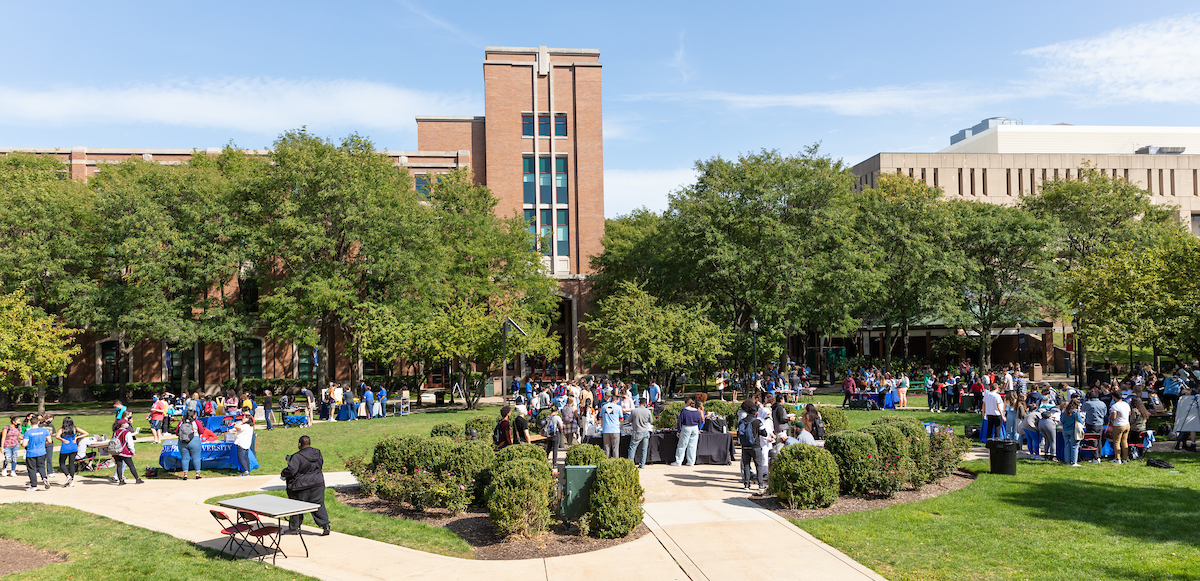 (DePaul University/Randall Spriggs)
(DePaul University/Randall Spriggs)This year's fall census enrollment outcomes shine a bright speck of light on the possibility of a thriving future we've been collectively imagining for some time now. We're not through the darkness yet, and we're still buffeted by headwinds. However, this light illuminates the breakthrough role of innovation, crafted with strategy which is executed with care, courage and collective commitment. As a poet once wrote: “There is a crack in everything. That's how the light gets in."
At a time when private higher education has been under tremendous market pressure, we welcomed academically talented, diverse and successively record-breaking freshman classes three years in a row - fall 2021 bringing the largest class in the university's history, with 2,838 freshmen. We reversed course in new transfer enrollment, creating 2.8% growth in fall-to-fall headcount for the first time since fall 2018. First-year retention improved 1.2% points to reach 84.1%. Fall-to-fall total undergraduate enrollment rose 1.1% for the first time since fall 2012. The College of Law saw meaningful improvements in both LSAT and GPA for the incoming class. New international graduate enrollment grew triple digits.
At the same time, total university enrollment declined 1.1% compared to last fall, with a headcount of 21,670 as of census. Though total headcount compares slightly favorably against the budgeted headcount of 21,657, we continue to see ongoing challenges in persistence and quarter-to-quarter continuation of students, particularly in later career years. New graduate enrollment declined 6.5% compared to the growth we experienced in fall 2020. Simultaneously, continuing graduate enrollment also declined at a similar rate. Based on the discount rate composition of the total student body, and provided historical continuation rates remain, we are not projected to exceed our budgeted net tuition revenue target, even as we exceed the headcount target.
In spite of the obvious challenges, ours is not a story of despair, unmooring or being adrift. It also is not a story of hope blind to facts, evidence and trends. Our success story is animated by discoveries, strategies and actions taken with care, courage and collective commitment to continue to innovate on behalf of our students and our mission. Consider just a few examples of all we have collectively accomplished in order to seed the ground for a thriving future in enrollment:
- Building from our experience of delivering all classes online, we developed teaching modalities, majors and support services designed for a digital-physical hybrid world we already are living in. Not only does this support varied learning styles, but also allows us to expand into student populations and geographies where we were previously not able to provide access.
- On the foundation of a stellar university honors program and our historically deep relationship with partner community colleges, we launched the first-ever transfer honors program for academically talented students. And we didn't stop there: seeing the multifaceted need to expose transfer students to our well-crafted liberal studies curriculum early in the college admissions process, we offered a philosophical inquiry course to qualified transfer students in the summer term. Both these initiatives helped boost our new transfer enrollment and - more importantly - established a new threshold for what transfer students can expect from a DePaul education.
- In order to simultaneously address the priorities of academic quality, compositional equity, affordability and volume growth in the new freshman class, we entirely reconstituted the mechanisms that determine university scholarships and de-emphasized test scores in favor of high school performance. We also introduced new scholarship programs, such as the State Scholar Plus scholarship that provides $100,000 in aid to qualified students over four years. As a result, for qualified students, DePaul education became as affordable as the state flagship institution. Through personalized and segmented communication and outreach, we welcomed a class with significantly higher academic preparation, while maintaining our focus on socio-economic and racial-ethnic diversity.
The census numbers tell us the story of what has already happened. They are a confirmation and verification of the past. Our strategies, our collective actions, tell us the story of what we are beginning. They are beacons of what is to emanate from our focused, institutional will.
That is the story of our tomorrow.
Soumitra Ghosh is the vice president for enrollment management at DePaul.